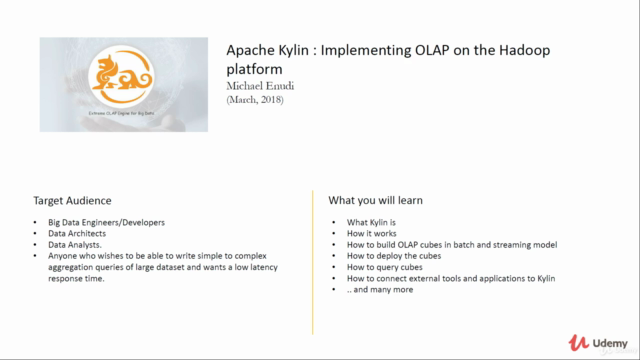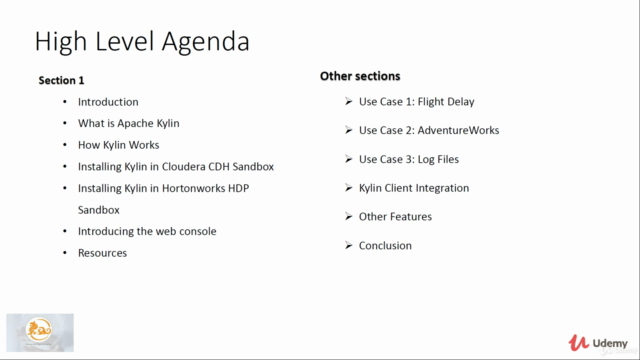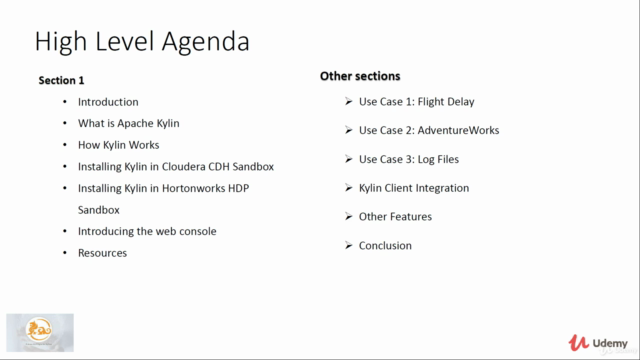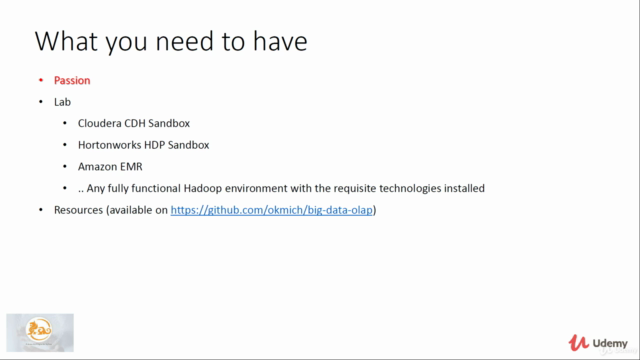Apache Kylin : Implementing OLAP on the Hadoop platform

Why take this course?
🎉 Apache Kylin: Mastering OLAP on Hadoop 📊
Course Headline:
Building and querying online analytical processing data (OLAP) big data structures in your Hadoop platform with Apache Kylin. 🚀
Course Description:
A Comprehensive Course for Learning How to Build and Query Big Data OLAP Cubes Using Apache Kylin.
Apache Kylin is a game-changer in the realm of big data analytics. It extends the capabilities of traditional OLAP to Hadoop, enabling you to handle massive datasets with unprecedented speed. Imagine performing complex aggregation queries on data spanning hundreds of millions or even billions of records and getting instantaneous responses. ⚡
Online Analytical Processing (OLAP) has been a cornerstone of business intelligence for years, but its integration with Hadoop's data lake solutions has been challenging, often leading to latency issues when querying large datasets. With Apache Kylin, those days are over. It empowers you to build, deploy, and query OLAP cubes using a web UI and achieve response times measured in seconds, not minutes or hours.
In this course, we'll dive deep into the mechanics of Apache Kylin:
- 🚀 Understanding Kylin: Learn what Apache Kylin is and why it's essential for OLAP on Hadoop.
- 🏗️ Building OLAP Cubes: Discover how to construct OLAP cubes both in batch and streaming models.
- 🚀 Deployment: Gain insights into deploying your cubes efficiently.
- ⚔️ Querying Cubes: Master the art of querying cubes for fast, accurate results.
- 🤝 Integration with External Tools: Connect Kylin with external tools and applications for seamless data processing and visualization.
Target Audience:
- Big Data Engineers/Developers
- Data Architects
- Data Analysts
- Any individual eager to perform fast, real-time OLAP analysis on large datasets. 🎯
Requirements:
To maximize your learning experience in this course, you should have:
- Access to a Big Data Sandbox like Cloudera QuickStart VM, Hortonworks HDP Sandbox, or a cloud-based Hadoop environment with at least 10GB of RAM.
- Familiarity with SQL and the ability to use ODBC or JDBC-based tools.
- Basic knowledge of Linux command-line operations will be beneficial but not mandatory. 🐧
Prerequisites for Success:
While this course is designed to be accessible, a fair understanding of the following technologies will enhance your learning journey:
- Apache Hive for data warehousing.
- Apache Kafka for real-time streaming and event processing.
- Apache HBase for NoSQL database functionality.
- MapReduce for processing large data sets with a parallel, distributed environment. 📈
It's important to note that prior knowledge of any big data technology is not required to query Kylin or utilize it for running reports or creating data visualizations. Apache Kylin is designed to be user-friendly and accessible to all levels of expertise. 🛠️
Embark on your journey to master OLAP with Apache Kylin today and transform the way you analyze big data! 🌟 #ApacheKylin #BigDataAnalytics #OLAPonHadoop #DataScience
Course Gallery




Loading charts...